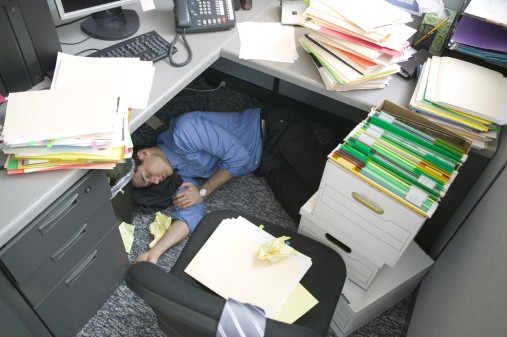When fighting against the exhaustion of a long afternoon, many workers struggle with the decision of whether or not to take a nap. In western culture, working long days are encouraged, and habitual nap-taking is frequently looked down upon as nap-takers are constantly perceived as lazy or unproductive.
Are consistent nap-takers forever doomed to be labeled as “slackers?” The answer is a resounding NO WAY! Chronic nappers should feel free to doze off in peace because many successful figures (who were not slackers!) are actually known for indulging in afternoon naps. Some of these napping celebrities include, Leonardo da Vinci, Thomas Edison, John F. Kennedy, Winston Churchill, and Ronald Reagan. Daily naps have additionally revealed many benefits in one’s health and work productivity. Bestselling author, Michael Hyatt, supports this notion by listing five reasons to take daily naps:
- A nap restores alertness. The National Sleep Foundation even explains that a short nap can improve alertness and performance without leaving you feeling groggy or unable to fall asleep at night. A nap can provide that extra boost which helps you efficiently get through the work day.
- A nap prevents burnout. Naps are beneficial when we need to reboot. Our bodies are allowed to briefly shut down so we don’t reach a maximum overload with our work. This also prevents us from running into problems with stress or frustration.
A nap heightens sensory perception. Our sight, scent, hearing, taste, or touch often becomes more sensitive after we have taken a nap. This allows our brain to work effectively through being more aware of our surroundings, or producing ideas with more ease.
- A nap reduces the risk of heart disease. A study by the Archives of Internal Medicine revealed that people who took naps at least three times a week were 37 percent less likely to die from heart disease. Because our bodies need time to heal and recuperate, naps can help us fight off unwanted diseases such as a heart disease.
- A nap makes you more productive. People naturally become more unproductive as the day goes on. Taking a nap can, therefore, restore one’s energy and help them become more productive later in the day.
There are ways to maximize the benefits and minimize the negatives of napping as well. Avoid long naps and focus on the “cat” nap. Sleeping for too long can prove to be problematic because it interferes with your routine of going to bed at night. It is better to take 20 to 30 minute naps instead. In order to not disrupt your nighttime sleeping patterns, nap in the late morning or early afternoon. This ideal time period ensures that a person will be tired once again as they prepare to go to bed at night. Not being able to sleep soundly at night can lead to exhaustion or becoming continually dependent on taking longer naps.
For the best results, be in a setting that is quiet and where you can turn the lights off. Due to our natural body cues, it becomes easier for our body to shut down in silence and when darkness is present. This will make it easier for you to fall asleep or will make it less likely for your nap to be continually disrupted. Because our body temperature naturally declines when we are asleep, using a blanket can make our napping experience more comfortable and enjoyable. It’s also a smart idea to avoid caffeine before a nap. This conflicting stimulant will make it more difficult to fall into a natural state of sleep.
When waking up from a nap, it is also suggested to wake up to a more soothing sound opposed to a harsh alarm (Body Ecology). A Zen Alarm Clock creates chiming tones when it is set off and ensures you aren’t jolted awake. It is easier on your mind and body to wake up in a more relaxed and refreshed state.
But if naps are part of a healthy routine, where does this afternoon tiredness stem from and why doesn’t Western culture embrace it? According to Body Ecology, when the outside temperature drops, our bodies are faced with an urge to sleep. This is why the tiredness your body experiences can affect your performance level. Taking a nap, however, can reverse the natural tendency your body has to fall asleep.
Because of these beneficial facets that arise from napping, the activity is increasingly becoming encouraged in work places. In fact, taking short naps during work is very common in places like China, Japan, and Mexico. In Japan the term used for this semi-sleep experience is “ineumuri.” Ineumuri can be viewed as a hybrid of sleeping off the job and sleeping on the job. The rules governing this practice are generally pretty strict, but when implemented correctly can be viewed as a sign of great respect (Michael Moffa). The popularity of sleeping in the workplace has most likely sprouted because it is viewed as a natural, low cost way to increase worker productivity, according to a business review article by Jitendra M. Mishra. Overall, there are more negative consequences that result from workers who lack normal amounts of sleep. According to a sleep deprivation study by Paula Alhola and Päivi Polo-Kantola, complete lack of sleep impacts basic tasks that slows down your working memory, long-term memory, and decision making. Even partial sleep deprivation can have a harmful effect that decreases your attention and vigilance capabilities. It is clear that your cognitive functions are completing tasks at a much slower pace, which can definitely affect your performance in the work environment.
The overwhelming benefits from napping clearly outweigh the idea of struggling to stay awake and producing sub-standard as a result. Even in the businesses of our tireless American environment, snoozing in the work place is no longer something that should be viewed as wildly uncommon. So, the next time you are faced with this predicament, maybe think twice before you decide to forgo the nap.
[sdonations]2[/sdonations]



